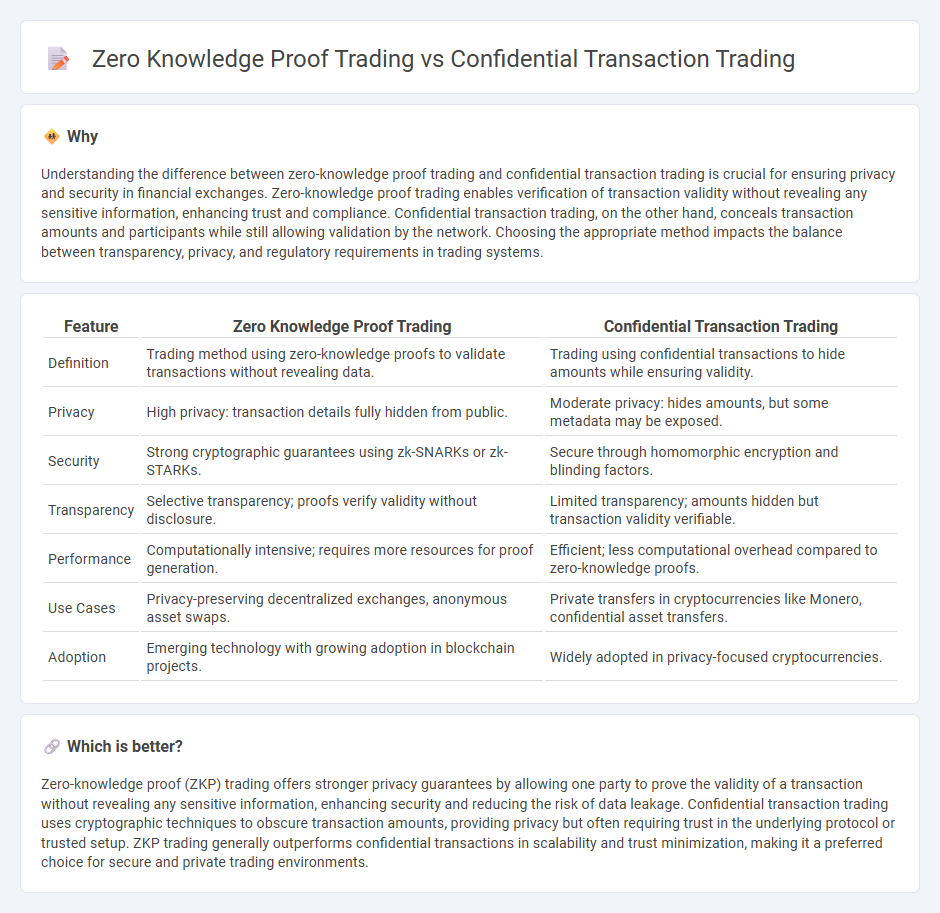
Zero knowledge proof trading enables validation of transactions without revealing any underlying data, ensuring enhanced privacy and security in decentralized finance environments. Confidential transaction trading conceals amounts and participant identities on the blockchain, maintaining transparency while protecting sensitive information. Explore the intricate differences and advantages of these cutting-edge privacy techniques in trading.
Why it is important
Understanding the difference between zero-knowledge proof trading and confidential transaction trading is crucial for ensuring privacy and security in financial exchanges. Zero-knowledge proof trading enables verification of transaction validity without revealing any sensitive information, enhancing trust and compliance. Confidential transaction trading, on the other hand, conceals transaction amounts and participants while still allowing validation by the network. Choosing the appropriate method impacts the balance between transparency, privacy, and regulatory requirements in trading systems.
Comparison Table
| Feature | Zero Knowledge Proof Trading | Confidential Transaction Trading |
|---|---|---|
| Definition | Trading method using zero-knowledge proofs to validate transactions without revealing data. | Trading using confidential transactions to hide amounts while ensuring validity. |
| Privacy | High privacy: transaction details fully hidden from public. | Moderate privacy: hides amounts, but some metadata may be exposed. |
| Security | Strong cryptographic guarantees using zk-SNARKs or zk-STARKs. | Secure through homomorphic encryption and blinding factors. |
| Transparency | Selective transparency; proofs verify validity without disclosure. | Limited transparency; amounts hidden but transaction validity verifiable. |
| Performance | Computationally intensive; requires more resources for proof generation. | Efficient; less computational overhead compared to zero-knowledge proofs. |
| Use Cases | Privacy-preserving decentralized exchanges, anonymous asset swaps. | Private transfers in cryptocurrencies like Monero, confidential asset transfers. |
| Adoption | Emerging technology with growing adoption in blockchain projects. | Widely adopted in privacy-focused cryptocurrencies. |
Which is better?
Zero-knowledge proof (ZKP) trading offers stronger privacy guarantees by allowing one party to prove the validity of a transaction without revealing any sensitive information, enhancing security and reducing the risk of data leakage. Confidential transaction trading uses cryptographic techniques to obscure transaction amounts, providing privacy but often requiring trust in the underlying protocol or trusted setup. ZKP trading generally outperforms confidential transactions in scalability and trust minimization, making it a preferred choice for secure and private trading environments.
Connection
Zero-knowledge proof trading and confidential transaction trading both enhance privacy and security in digital asset exchanges by enabling verification of transactions without revealing sensitive details. Zero-knowledge proofs allow traders to prove the legitimacy of a trade without exposing amounts or participants, while confidential transactions encrypt transaction values to prevent third-party observation. Together, they create a robust framework ensuring trust and confidentiality in blockchain-based trading environments.
Key Terms
Confidential Transactions
Confidential transaction trading leverages cryptographic techniques to conceal transaction amounts and participant identities, enhancing privacy on blockchain networks like Bitcoin's Liquid sidechain. This method utilizes Pedersen commitments and range proofs to ensure transaction validity without revealing sensitive data, making it a powerful tool for secure, private financial exchanges. Explore how confidential transactions redefine privacy and security in digital asset trading.
Zero-Knowledge Proofs (ZKP)
Zero-Knowledge Proofs (ZKP) enable confidential transaction trading by allowing one party to prove knowledge of specific information without revealing the data itself, enhancing privacy and security on blockchain networks. Unlike traditional confidential transactions that mask amounts but still expose some metadata, ZKP techniques provide stronger cryptographic guarantees for transaction validity without disclosing sensitive details. Explore how ZKPs revolutionize privacy in trading and blockchain ecosystems by delving deeper into this transformative technology.
Privacy-preserving Protocols
Confidential transaction trading utilizes cryptographic techniques such as Pedersen commitments and range proofs to hide transaction amounts while ensuring validity on public ledgers. Zero-knowledge proof trading employs zk-SNARKs or zk-STARKs to allow one party to prove knowledge of transaction details without revealing underlying data, enhancing privacy beyond traditional methods. Explore the evolving landscape of privacy-preserving protocols to understand their impact on secure, anonymous trading.
Source and External Links
What are Confidential Transactions? - Confidential Transactions (CT) are cryptographic protocols based on zero-knowledge proofs that enable private and anonymous cryptocurrency transactions by encrypting transaction amounts so only the parties involved can see them, enhancing privacy and fungibility on blockchains like Bitcoin.
Confidential Transactions (CT) - Bitcoin Glossary - Confidential Transactions are implemented on networks like Liquid to blind asset amounts and types transferred, allowing nodes to verify transactions securely while keeping financial details private from outside observers, benefiting businesses and individuals concerned about exposing sensitive trading information.
RECOMMENDATIONS on INFORMATION HANDLING with Confidential Information - In trading, confidential information includes details about trades, orders, and positions; best practices advise limiting information sharing, communicating truthfully, and protecting sensitive trading data to preserve market integrity and participant interests.
 dowidth.com
dowidth.com